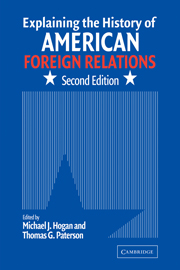Book contents
- Frontmatter
- Contents
- Preface to the Second Edition
- Contributors
- 1 Introduction
- 2 Defining and Doing the History of United States Foreign Relations : A Primer
- 3 Toward a Pluralist Vision : The Study of American Foreign Relations as International History and National History
- 4 Theories of International Relations
- 5 Bureaucratic Politics
- 6 Psychology
- 7 National Security
- 8 Corporatism
- 9 World Systems
- 10 Dependency
- 11 Considering Borders
- 12 The Global Frontier : Comparative History and the Frontier-Borderlands Approach
- 13 Modernization Theory
- 14 Ideology
- 15 Culture and International History
- 16 Cultural Transfer
- 17 Reading for Meaning : Theory, Language, and Metaphor
- 18 What's Gender Got to Do with It? Gender History as Foreign Relations History
- 19 Race to Insight: The United States and the World, White Supremacy and Foreign Affairs
- 20 Memory and Understanding U.S. Foreign Relations
- Index
1 - Introduction
Published online by Cambridge University Press: 05 June 2012
- Frontmatter
- Contents
- Preface to the Second Edition
- Contributors
- 1 Introduction
- 2 Defining and Doing the History of United States Foreign Relations : A Primer
- 3 Toward a Pluralist Vision : The Study of American Foreign Relations as International History and National History
- 4 Theories of International Relations
- 5 Bureaucratic Politics
- 6 Psychology
- 7 National Security
- 8 Corporatism
- 9 World Systems
- 10 Dependency
- 11 Considering Borders
- 12 The Global Frontier : Comparative History and the Frontier-Borderlands Approach
- 13 Modernization Theory
- 14 Ideology
- 15 Culture and International History
- 16 Cultural Transfer
- 17 Reading for Meaning : Theory, Language, and Metaphor
- 18 What's Gender Got to Do with It? Gender History as Foreign Relations History
- 19 Race to Insight: The United States and the World, White Supremacy and Foreign Affairs
- 20 Memory and Understanding U.S. Foreign Relations
- Index
Summary
World War I helped to spawn the first generation of specialists in the history of American foreign relations, most of whom had been trained originally as political historians. Influenced by that training, as well as by the war, these scholars soon created two distinct approaches to the study of American foreign policy. The nationalist perspective of Samuel Flagg Bemis and Dexter Perkins stressed the continuities in American diplomacy. These scholars celebrated the growth of American power and the creation of an American diplomatic tradition marked by such hallowed principles as those embodied in the Monroe Doctrine. Although not indifferent to the domestic influences on American foreign policy, they concentrated primarily on state-to-state relations, placed American diplomacy in an international, usually European, setting, and often conducted research in foreign archives that established a high standard for subsequent scholars.
From the start, however, Charles Beard and other progressive historians challenged the nationalist perspective. The scholars in this school were less enamored of multiarchival research and less inclined to focus on state-to-state relations. They searched instead for the intellectual assumptions that guided American policymakers and for the domestic political, economic, and regional forces that shaped their diplomacy. Because these forces varied with historical circumstances, the progressive historians saw change rather than continuity, conflict rather than consensus, as major features in the history of American foreign relations.
Information
- Type
- Chapter
- Information
- Publisher: Cambridge University PressPrint publication year: 2004
